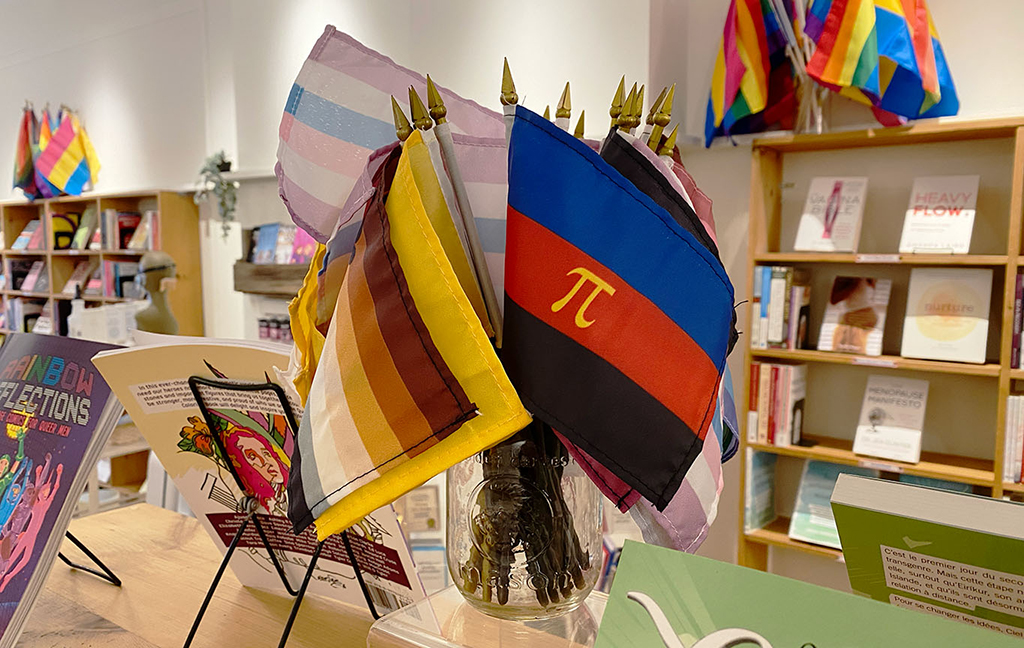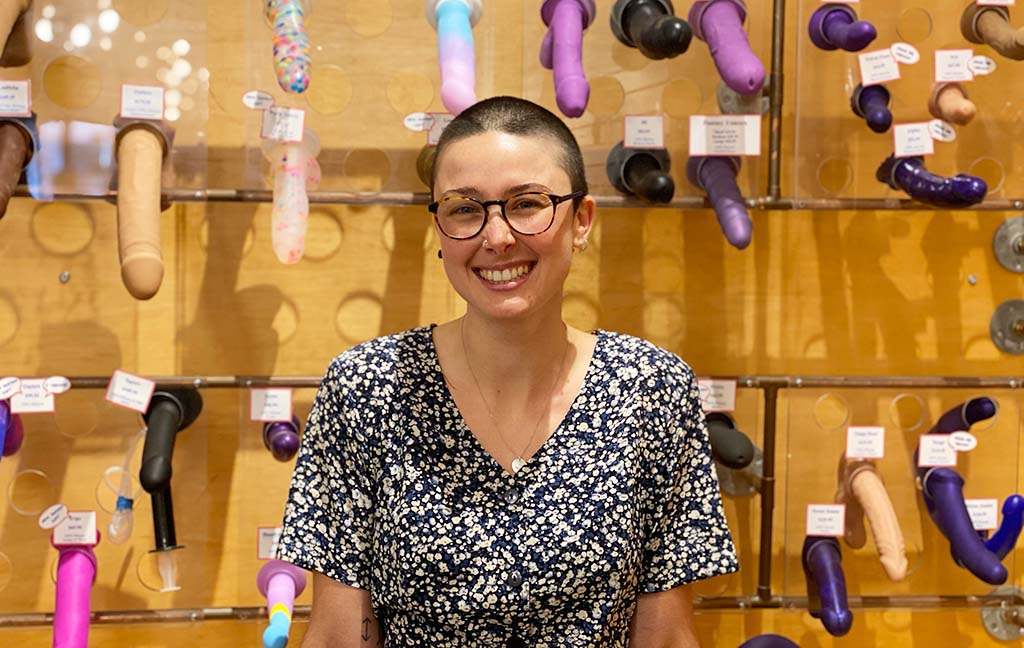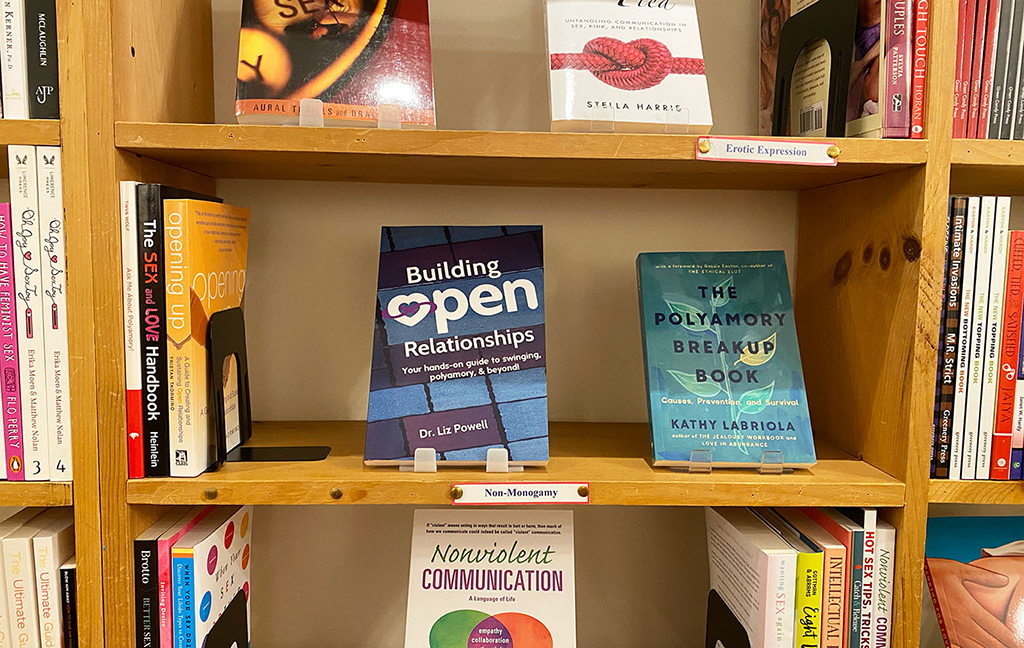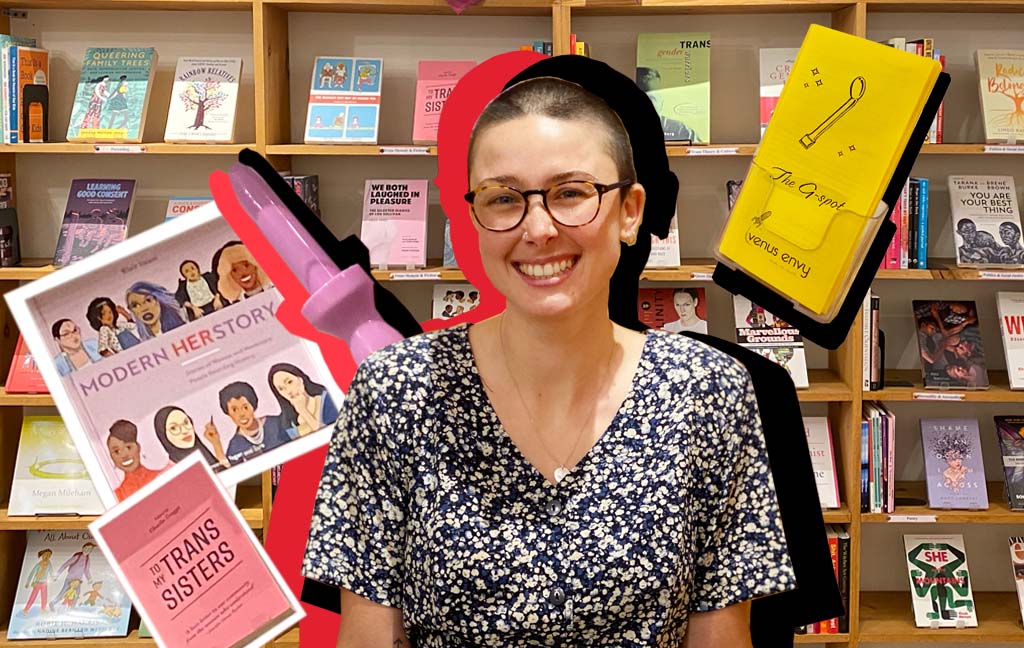Photo Illustration of Paige McKenny by Constantina Varlokostas and Natalia Weichsel
Twenty-somethings are ditching traditional relationship customs in place of polyamory, according to 28-year-old Paige McKenny, but no one is talking about it.
McKenny took up non-monogamy in their mid-20s after grappling with a series of relationships they would describe as non-functional and emotionally abusive.
But the idea of an open approach to love didn’t begin to brew until a conversation with a partner in 2015 that helped McKenny understand what non-monogamy really meant.
“When we started seeing each other, we both knew we wanted certain things in life that were going to lead us on divergent paths. And so when we began our relationship, we had a really frank discussion about what we wanted, and what we needed,” McKenny said.
The couple ultimately decided to have an open relationship with no expectations for the future.
“We were really interested in spending time together and cultivating a relationship, knowing that there was an end point to it.”
For twenty-somethings like McKenny, ditching traditional relationship customs such as marriage in place of polyamory has a growing appeal. From self-help books on becoming an ethical slut to the BBC series Trigonometry to 2019’s very public break-up of Hollywood triad Tana Mongeau, Bella Thorne and rapper Mod Sun, polyamory is having a moment. Even if the idea of having multiple concurrent partners may be taboo among some older generations, one in five Canadians have been involved in a consensual non-monogamous relationship, according to one study.
Experts and everyday explorers of non-monogamy all agree honesty, open communication and trust offer the best chance of success.

Polyamory, polygamy are different ends of the spectrum
What is polyamory? Some may confuse the term with polygamy, however, according to Noémie Kyryluk, they are two very different ends of the spectrum. Kyryluk, a registered psychotherapist and certified sex therapist, likes to describe polyamory as having different people to fill different needs whereas polygamy involves one man with multiple wives.
“A way that I like to think about it is as friendships, you have multiple friendships. Rarely does one person have one friend that you expect to do everything with you,” Kyryluk said. “Different people meet different needs, and you expect that, it’s just the norm. Polyamory is kind of the same concept.”
She explained that overall, polyamory is an umbrella term to describe when a person can’t have all of their needs met by a single partner so they have multiple partners where each person brings in a different dynamic, whether romantically, sexually or platonically.
According to the educational, sex positive website Sex and Psychology, Justin Lehmiller reported that approximately one in five Canadians have been involved in a consensual non-monogamous relationship. In his study, Lehmiller concluded younger adults were more experienced than older adults with open relationships and suggested there may be generational differences in openness to non-monogamy.
Kyryluk offered a similar perspective.
“I think the younger generations are just a little bit more open. They’re more open to the possibilities of all these different relationship styles, different types of sexuality, to talking about mental health and therapy,” she said. “Whereas with older generations, I find that there’s a lot of shame. They’re not sure if what they’ve done is okay, or whether it’s still taboo.”
Open relationships need open communication
For some young adults like Cynthia Pham, what brought her to polyamory was the emotional tyranny she experienced in her previous monogamous relationships.
Pham, a 23-year-old student at McMaster University, said the emotional barriers between herself and her partners led to unhealthy monogamous relationships in the past. With her latest partner, the possibility of pursuing an open relationship came up when they realized they would soon be a long-distance couple. It ended up creating the healthiest connection for them both, she said.
“I think another important thing in open relationships is that if anything changes in the relationship, because things are fluid, you always have to be open to communicating it with your partner,” Pham said.
Being in an open relationship with a man that had a deeper understanding of himself forced her to feel comfortable communicating her emotions.
Raphaella Valeri, a young professional, also believes communication is a big part of the process when exploring non-monogamy, especially when navigating it with her current partner.
“What helped us both become comfortable with this was just the fact that our relationship is so strong and healthy and that we are already really good at communicating,” she said.
Valeri described her five-year long relationship with her boyfriend as strong, trusting and something she sees going long term. Her interest in polyamory sparked a couple years back by speaking with her therapist and friends involved in open relationships. She researched the topic with her boyfriend by reading Dossie Easton and Janet Hardy’s book The Ethical Slut and by discussing relevant passages together.
By the end of this process, Valeri says she felt as if they built a strong enough foundation to handle an open relationship. She said this move was necessary for herself to grow and step outside of her comfort zone as her current partner was her only experience in dating.
Positive feelings of freedom are common among individuals who practice ethical non-monogamy. For Valeri, the term polyamory means independence, maturity and the ability to get to know other people and develop new relationships.
Similarly, McKenny described it as “the ability to be an individual.”

“I think it’s a great tool for introspection and being really self-aware and self-sufficient,” McKenny said. “Which is funny because you think with more people in the mix, you have less self-sufficiency or you have more people to fill your needs, which is true, but this means you need to know what those needs are, which requires a lot of introspection.”
According to Kyryluk, it’s important to note the differences between non-monogamy and infidelity. “Some people will say non-monogamy is synonymous to infidelity, which it is not, because the most damaging part in infidelity is really the betrayal and broken trust – all of the emotional stuff that surrounds it,” she explained.
“Ethical non-monogamy really focuses on that transparency, like, ‘Yeah, okay, we might be sleeping with other people, but we know it and we have boundaries and limits.’”
‘Love is important, but it’s tough’
When it comes to relationship styles, non-monogamy isn’t the only conversation buzzing among young people – marriage nears the top of the list.
This generation has seen it all throughout their childhood – from dysfunctional families to infidelity. As divorce rates increase, some young people don’t see marriage as an end goal.
Although Seager Wakil, a 23-year-old student, cannot see himself practising non-monogamy, he is also unconvinced that being legally bound to a partner is necessary due to being a child of divorce.
“I shake my head at people who rush into marriage early. I think there are so many real things that need to be addressed and you need to be so practical,” Wakil said. “Love is important, but it’s tough. Love can’t save financial issues or different communication styles.”
The desire for a life partner is attractive to the younger generation but without the paperwork.
“I have strong yearnings for a nesting partnership or an anchor partnership, something that feels like we’re walking a life path together,” McKenny said. “I think at the moment, [my partner] and I have expressed a mutual interest and that sort of trajectory to our relationship. I don’t think that there’s any reason for our relationship to have strong domestic poles towards each other,” they said.

Kyryluk’s advice for people interested in exploring non-monogamy is to invest in educational resources such as therapy, books and workshops.
“The best advice I can give people is to really take a proactive approach, and to talk about all of your expectations. If you don’t talk about your expectations, your wants, your needs, your limits, your boundaries, it probably won’t be super successful.”
Resources to learn more about non-monogamy and sex education:
Polysecure: Attachment, Trauma and Consensual Nonmonogamy By: Jessica Fern
More Than Two: A Practical Guide to Ethical Polyamory By: Franklin Veaux and Eve Rickert
Opening Up: A Guide to Creating and Sustaining Open Relationships By: Tristan Taormino
Venus Envy – Shop
Good For Her – Shop
Luna Matatas – Educator

